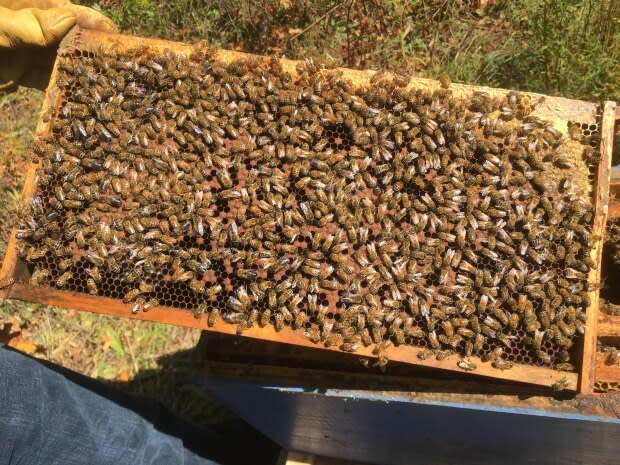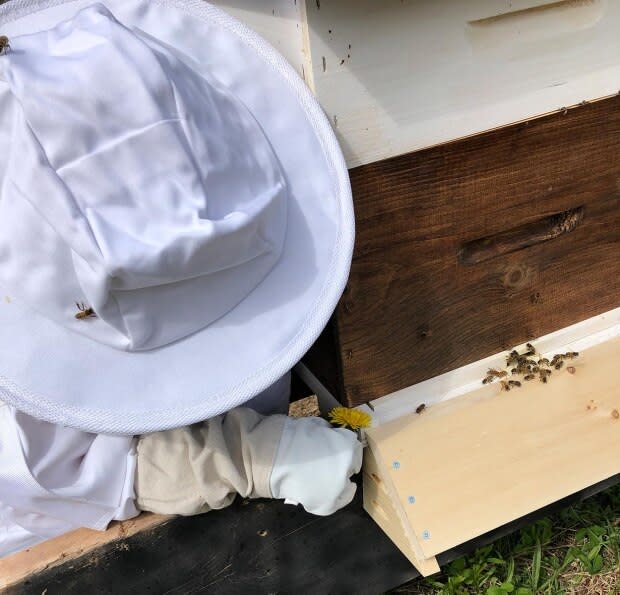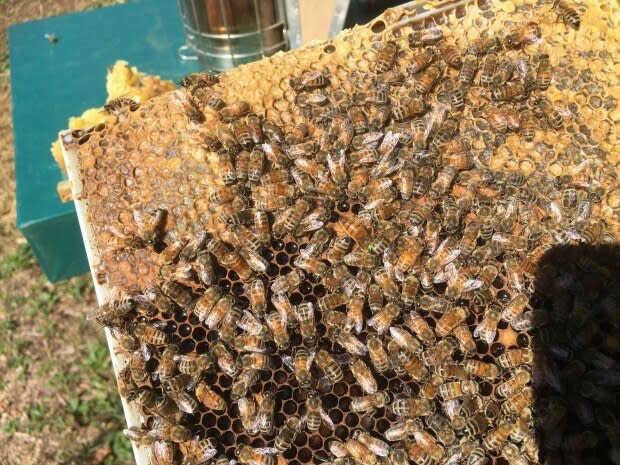'They feel like your pets': Dad shares love of beekeeping with daughters
Troy Fraser, his smiling face covered in a mesh hat as honeybees buzz around his head, doesn't flinch as he casually flicks a dead one off his sleeve.
Honeybees die after they sting you. And Fraser had just been stung.
Again.
"I'm at the point now where I don't react to them, it just feels like a sharp pinch," he said.
"Getting stung is part of the business. If you're not willing to get stung then you shouldn't necessarily be a beekeeper."
The stings are well worth it for Fraser, who bought his first three hives in May and nurtured them to 14 by mid-September.
"It's kind of like my happy place," he said.
"It's one of those areas where you can be in nature and be in control of the situation, but at the same time be not in control. You open up a hive and then you see thousands of bees there, and just knowing in the back of your head that at any moment they can all come sting you or attack you."

Fraser is one of about 50 beekeepers on P.E.I., according to Dave MacNearney of the P.E.I. Beekeepers Association. He said there are about a dozen commercial beekeepers, who have more than 25 hives.
The rest are considered hobbyists like Fraser, who usually get into it to make their own honey or beeswax products or help farmers pollinate their fields.
Charlottetown working on bylaw
There are currently no specific rules or regulations to beekeeping, MacNearney said, though the city of Charlottetown is in the midst of passing a bylaw to ban backyard hives.
Fraser keeps his hives in a south-facing, sheltered field not far from his home in Mermaid.

Beekeeping has even become a family affair for the Frasers. Two of his daughters, Lucy, 10, and Annabelle, eight, asked for beekeeping suits for their birthdays in the summer so they could accompany him to the hives.
"It may sound like I'm off my rocker but it's almost like your pet," he said. "They feel like your pets, your family pet."
One time after returning home from visiting the hives with Lucy, they noticed a baby bee — which didn't yet have the ability to sting — was in the truck.
"I said, 'Well that bee's probably going to die because it's outside its hive," Fraser said. "Next thing I know she's running up the street through the woods and she takes that bee back to the hive."

Lucy, who has only been stung once, said she enjoys helping her father with the bees.
"I like hearing them buzz," she said.
Queen Lucy
She recently got the chance to mark one of the queens with a green dot. She named that one Queen Lucy, of course.
Fraser said before he bought his hives, he spent about a year researching how to keep bees, watching YouTube videos and reaching out to other beekeepers on the Island.

He said he paid about $600 for his first three hives, which he bought in Nova Scotia. And there are other expenses — he got some strange looks when he left the grocery store with 60 two-kilogram bags of sugar he mixes with water to feed the bees.
He said he'd eventually like to get into commercial beekeeping, especially when he retires. His girls could make lip balms and candles, he said, while he sells honey and pollination services.

For now, he's happy to just learn more about bees and support anyone who might want to try beekeeping.
"Getting into bees was kind of like a childhood fascination," he said. "I always wanted to learn and study bees, but always scared to be stung. And as I grew older, just the fascination and the science geek in me wanted to take it one step further."

More P.E.I. news


